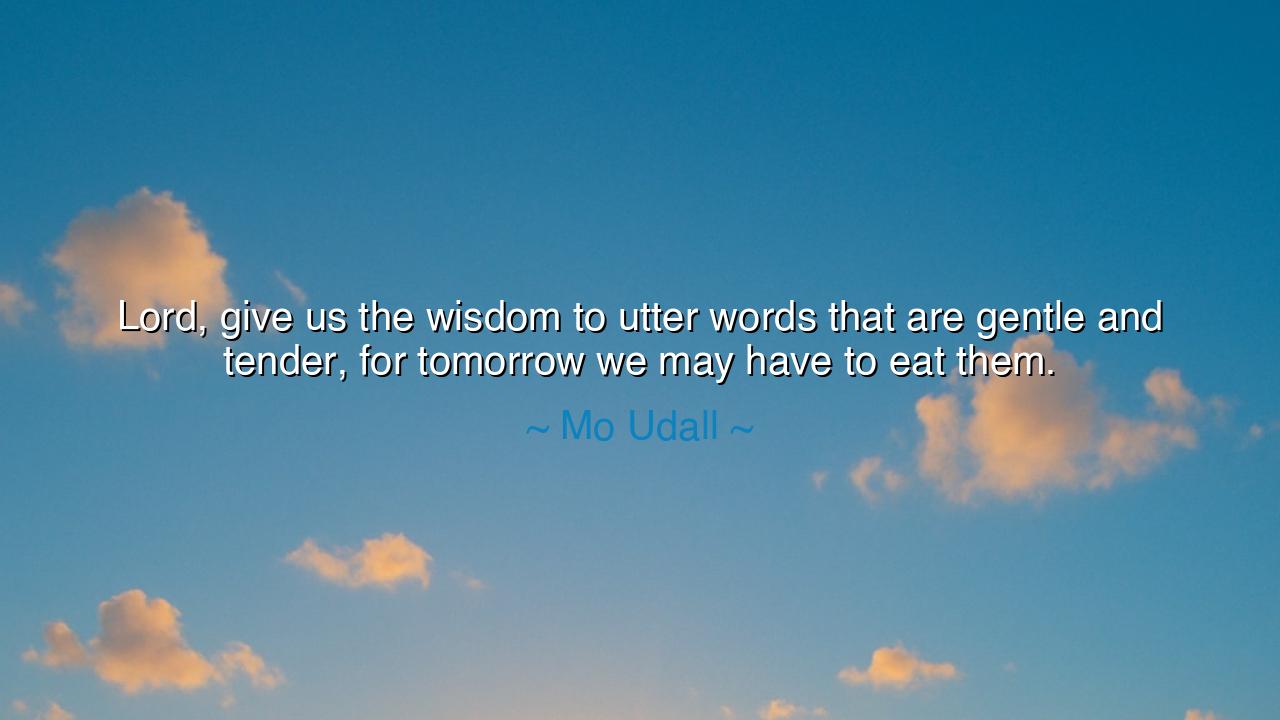
Lord, give us the wisdom to utter words that are gentle and
Lord, give us the wisdom to utter words that are gentle and tender, for tomorrow we may have to eat them.






Mo Udall, with wit sharpened by humility, prayed thus: “Lord, give us the wisdom to utter words that are gentle and tender, for tomorrow we may have to eat them.” In this saying lies both humor and solemn truth. Words, once spoken, cannot be recalled, yet they often return to their speaker, demanding accountability. To speak harshly, arrogantly, or rashly is to lay snares for one’s own feet; but to speak gently and tenderly is to sow seeds of peace, even if those words must later be swallowed. Thus Udall’s prayer is not only jest—it is a cry for the wisdom of restraint, humility, and foresight.
The ancients also knew this power of the tongue. Solomon declared, “A gentle answer turns away wrath, but a harsh word stirs up anger.” The Greeks, too, warned that speech was like fire: a servant when controlled, a master when unbridled. Udall’s words echo these ancient voices, reminding us that every utterance carries consequence, and that the wise weigh their speech as carefully as gold.
History bears witness in the story of Abraham Lincoln. Known for his eloquence, he mastered not only the art of powerful speech but also of tender restraint. When generals blundered or rivals attacked, he often drafted letters of scorn but never sent them, choosing instead words that would build rather than destroy. This habit of gentle words preserved unity in times of peril and reveals the strength that lies in speech tempered with humility.
By contrast, consider Napoleon, whose sharp tongue wounded even his allies. Though he was a genius of war, his harsh words estranged those closest to him, and in his downfall he was left isolated. His story proves Udall’s warning: bitter words, once spoken, often return with bitterness to the speaker’s own mouth. It is better, then, to season speech with grace, for tomorrow may demand that we taste it again.
Let the generations remember: words are living things. They travel forth, but they do not vanish; they circle back to the one who sent them. To speak with gentleness and tenderness is to guard one’s future against regret. To speak with cruelty is to forge chains for one’s own neck. Thus Udall, in his humor, spoke a deep and timeless truth: that the wise man prays not only for knowledge, but for the restraint to let his words be as bread that nourishes, not as poison that destroys.






SBNoi Su Ba
What I love about this quote is its mix of humor and truth. It’s a reminder that we often end up facing the consequences of our own words. But it also makes me wonder—why is it so hard to speak gently in the first place? Maybe because we confuse gentleness with weakness, when in reality it takes great self-control. It’s a clever way of saying that grace is a form of wisdom.
MLMai Linh
This idea makes me reflect on accountability. So often, people underestimate the power of words, forgetting that they can’t be taken back once spoken. It’s interesting that Udall connects wisdom with tenderness—it suggests that strength in speech isn’t about force, but care. I’d love to explore whether society values this kind of gentle communication enough, especially in politics or social media where harshness is often rewarded.
TCTrang Chanh
I find this quote both humorous and deeply wise. It captures how unpredictable life can be—how quickly circumstances can change and make us rethink what we once said so confidently. It’s a gentle reminder to stay humble and compassionate, even when we think we’re right. But I’m curious: do we ever truly learn this lesson, or is it one we have to keep relearning through experience?
KPKhanh Pham
This quote really speaks to the importance of humility in communication. It makes me think about how easily we say things in anger or pride that we later regret. Words have a way of echoing back to us, sometimes in ways we don’t expect. I wonder, though—how do we train ourselves to pause and speak with kindness, especially in heated moments? Maybe real wisdom starts with restraint.